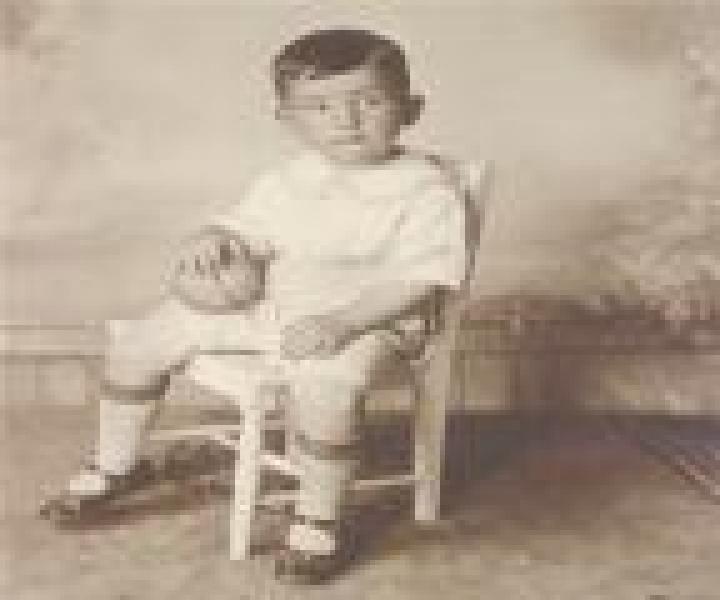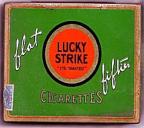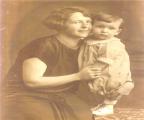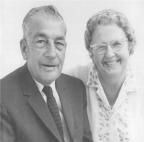
Image of William Gieske as a Child
By William Gieske
School: I can remember starting school at Higbee School on Spring Street in Bethlehem, Pennsylvania. I even remember my first crush. It was on one of the Flammer twins.
Mr. Flammer had a meat market on Spring Street and his twins were in my grade. Robert and Roberta, she did not seem as pretty later on in life but in second grade you are easier to please, I guess.
We had a large back yard with buildings along the alley, one of which was an outhouse. My brother Neal threw a kitten down the hole one summer day and cousin Earl had the job of fishing it out, but I don't know who cleaned it up. I do remember the honey dipper coming to clean the outhouse as they were called. Now there is a job that disappeared and no one regrets its demise.
Uncle Nelse kept rabbits in the back yard. I believe at that time it was going around as a get rich scheme. I remember that a big dog got into the pen and killed a lot of rabbits and to his misfortune could not get out. I know he met the same fate as the bunnies. No ACLU to plead his case of a bad childhood.
Friends:
Life picked up when we got new neighbors. The Nebingers. Frank Nebinger worked at the Bethelem steel mill as a draftsman and had steady work, which was more than most had. Mrs. Nebby, as we knew her, was of French descent as opposed to Mr. Nebby who was more proper English. Quite a contrast, she was an easy living and easy going, no worries kind of a person, while he was prim and proper. Mrs. Nebby wore sneakers in the summer, which was unheard of for a women back then.
When the weather got hot she moved into the basement, put in a kerosene stove and some furniture and lived there all summer. Their oldest daughter was Grace, who married Frank Degnan later in life, but my buddies were Bobby and Eddy. We remained friends all our lives, though Bobby is gone now and Eddy is in Connecticut. Bobby was very inventive, an excellent mechanic and rougher than Eddy who took violin lessons. That always branded you as a sissy back then unless you managed to overcome it by your other deeds.

I can remember one summer Bobby made a pair of chaps out of an old raincoat for me and decorated it with the Indian heads cut from the flat fifty tins that Lucky Strike Cigarettes came in.

At that time I thought it was the greatest.
There was a bar in the alley that was at the rear of the yard and the local drunk would sometimes pass out and sleep it off there. One time we threw Saltines crackers on him trying to entice a small dog we had, up onto his chest. Uncle Nelse gave us an old canvas he used as a drop cloth for painting so we made a tent from it.
We had this tent in the back yard next to the garage and we were playing in it with Farley Kramer when the drunks son, who was sort of a bully, came along. One thing led to another and a rock fight started. Farley got hit on the temple and bled profusely. Of course we told the other kid he was going to die to scare him off so that ended the fight with us the declared victors I guess. I think that it was the best time Farley ever had because he was so sheltered he never got a chance to be a real boy.
Bill Kramer his father didn't get too excited as I remember but the Mother really took off. Farley died soon after that, one of my earliest experience of losing someone I knew well. He died from some heart aliment that at that time was incurable. I believe it was a valve.
I liked to talk to Bill Kramer about his war experiences as he stayed for occupation duty after the war. Like most old vets he liked to talk about it if you could get him started. I know at the time I did not fully understand it.
There were sheds along the alley to store garden tools and such in. My brother, Neal, got locked in there one time and hollered like crazy to get out. We thought he was just being childish, but when we opened the door we found he had his thumb in the hinge side of the door and it was pretty flat. He got a lot of sympathy from Mom while we caught you know what.
Games:
Another game we played was Nipsie. Today if you wanted to play you would have everyone including the federal consumer products safety commission down on you. Now we have a government that will try to protect you even if you do not desire their protection. But we played Nipsie because we only needed an old broom stick for equipment. A piece about three feet long was cut off for the bat and the Nipsie was a piece about six inches long.
The Nipsie was sharpened on both ends so if an end was struck it would fly up and then you would hit it, so no pitcher was needed this way. The game was similar to baseball, according to how many played. It was kind of hard on the fingers catching the flying Nipsie but we were young and it was part of the game.
Higbee School was the place to play. It was dirt and sloped away from Franklin Street, so that area was the home base. There was a large sandbox at the lower corner where we could also play, but it was torn down later. I remember large swings that were in the playground very well. They were supported by large pipes about four inches in diameter. As visible as these were, I still managed to run into one at top speed, turning around to look just in time to hit it with my nose, the first of three times it was broke.
I remember being in the school yard when my father and Uncle Ervin came rushing through heading west on Spring Street. I and who ever I was with followed behind them. Just beyond Liberty on Spring Street my cousin Paul lay on the sidewalk in a pool of blood. He was climbing an old cherry tree after a kite and fell when a limb broke. Cherry trees will do that as some times they are rotten inside the limbs. Paul ended up OK except for his arm that never was the same after that.
Charlotte and Betty Delong lived in the alley by the school and Mom was good friends with their mother, so they would visit and we played in the yard. Their father, Norm, was a large man who worked on the railroad and I remember seeing him when I worked for the phone company and repaired sets where he worked.
The extreme part of west Bethlehem was known as Elliot Heights and was pretty barren of homes. There were a few farms and lots of gardens. I remember going out that way with my father and we stopped to cut an old stump open to get wood worms for fishing. I don’t remember catching any fish but we still had a good time. It was one of the few times I remember him taking time to enjoy life instead of making a living for us.
Prospect Avenue was smooth especially around Eugene Graces place, the local millionaire. Bobby and Eddy and I had clamp on shoe skates, no fancy in-line skates like today. I remember skating out Prospect Avenue and back home, a long trip for us back then, as there were only a few places we were allowed to go off by ourselves.
Movies:
I remember the old Savoy Transit that was remodeled and closed for several weeks to open later as the Nile Theater. I don’t know what we paid then, but I remember back about 1937 when they raised the price from ten cents to eleven cents and we were caught short without the penny but managed to get help from others in the crowd, so we did not have to go home. Saturday movies was what it was about then. You went in about one o’clock and came out about four thirty. There was news, cartoons, several other shorts and then the western. We all had favorites and there were plenty to choose from.
We were not as sophisticated as today's viewers, so we were easier to please. We all were cowboys and shot lots of Indians, (Native Americans that is), on the way home and during the week until the next show.

I can remember Mom going to see the first Frankenstein movie. It was all the rage then and also quite daring to see the movie. You can not understand the shock value of that movie when it first came out, it seems silly today but was quite risque back then.
Funerals:
I don’t remember the funeral for Farley, but I do remember a little of the funeral of my grandfather. My mothers father, Franklin Zettlemoyer, was found dead in the Monacacy Creek, behind the paint mill. It was not understandable how he got there.
We were led to believe he was in the state hospital at Rittersville, Pennsylvania. That is what the nut house was called. When I started doing genealogy, I uncovered the truth. He had been injured at the iron works, this was before the Bethlehem Steel Co., and he was in Saint Luke's for a time for a head injury. He was the first patient admitted at Rittersville, Pennsylvania. He was transferred to the poor farm, or the county home for the elderly, as it was known. This was located near Schoenersville, Pennsylvania.
He must have started down Shoenersville Road for home. At that time Eighth Avenue was not cut through, so he went down to the railroad tracks, intending to walk south until he came to Prospect Avenue or Spring Streets, as that would be the logical way home. He must have gone for a drink at one of the springs in a picnic area behind the Paint Mill.
He slipped or had a heart attack and fell into the ice cold water and died. He was found the next day by some boys playing along the creek. This was in late winter so it could have been icy along the stream. I found this information in old newspapers at the library. I can remember the coffin in the front room that was used by us as a living room. The funeral was held at the Lutheran Church on Third Avenue. I remember that there were a large numbers of relatives that came and we ate in the backyard like it was a picnic. It was slow traveling long distances then so those attending were given a place to stay and the custom was to also feed them. This is carried over today with the mourners going back to the house or some where to eat.
Fishing:
Uncle Bill was a great fisherman, not bass or trout but suckers. No fancy boat or rod and reel, he was a handliner. That is a lost art today. In the spring, the suckers are active because they will be spawning. Suckers are bony and in warm weather quite soft but in spring they are firm and most often full of roe. They are a favorite sport of some today. Hand lining is done without a pole or reel. The line then was cotton or linen almost like a kite string. A heavy sinker was on the end followed by several hooks baited with night crawlers. The line is neatly laid out on the ground in front of you in an area you cleared of sticks and debris. Taking hold of the line, above where the sinker and hooks are, you twirl it around in a circle building momentum and let it fly out into the river or pond.
The Lehigh River was close for Uncle Bill and he sometimes took me along. It was here I remember seeing the canal boats coming along the canal with a mule or two providing the power. The canal boat was their home so wash would be on the line and sometimes a meal was cooking as they traveled. It was like camping while you were working. Aunt Helen had an old fashioned slate sink, large and deep and sometimes the suckers would be still trying to swim before they were cleaned. Many were full of roe that was tasty when fried and sometimes breaded, a meal Aunt Helen was good at preparing.
The fish also had an air bladder like a small balloon that was fun to play with when you are young. I ate with Uncle Bill and Aunt Helen a lot when I was younger and I remember her as a great cook. One time when she made pigs stomach, an old Pennsylvania Dutch dish, and I tried eating a part of the stomach that is used only to cook the other goodies in and to pass on the taste. It was like trying to eat chewing gum, or an old boot, as it is very tough. This dish is like the Haggis the Scotch make, but they use sheep's stomach. It sounds awful but tastes great.
I still have a small scar on my leg from a store trip I made for Aunt Helen. Dieters store was down on Spring Street below Uncle Bills house and one time I went for milk that came in glass bottles. When I came back up I was too interested in the sand pit and not watching where I was going and fell. The bottle broke and I got a cut on my leg from the glass. No emergency room. Just sympathy and a bandage on the cut. The hugs and reassurance probably helped more than anything, as I was only about six years old, but I still think of it when I am reminded by the scar.
Jake Kilpatrick had a feed store in Hellertown and lived on Hanover Street near the Kaufmans. In the rear of his property he had a large garage type building. There was a bottle washing business in the rear by the alley. Most bottles had a deposit on them, so they would be returned for reuse.
Bottles were returned and this outfit would wash all kinds of bottles. We would stop to watch them sometimes when we came down the alley. There were two men washing bottles all day long. This was by hand with a motor driving a long brush that went into the bottle. What a boring job it must have been, but it was work which was scarce back then.
Snakes:
Uncle Bill and Nelson would go camping in the Poconos a lot. Bill worked in the silk mill and Nelson worked on the railroad, as an engine driver. In the summer, they would take off in Nelson’s old touring car. Bill never did drive or have a car. They had the accordion things on the running boards to hold their gear and the rear had crates full of boxes to hold the huckleberries they would pick.
Today we buy the commercial blueberries but then many a family lived on the money berry picking brought. The trick was in avoiding the rattlesnakes and getting the berries before the bears. Nelson got along with the snakes and they never were chased by the bears, so I guess they knew how to scare them off also.
Nelson brought home rattlesnakes on occasion. He made a small box with double wire on it and a special door and used that to transport his pets. Young's drugstore was located near Broad and Main with their main store. They contacted him for a display, so we would go by to see our uncle’s snakes. He had about six or seven crawling around in the display window. He went in with the snakes at least one time to set back up signs they knocked down.
I also went up to Uncle Ervin's house to visit and play with the boys. Sometimes I would sleep over and we would listen to the radio with Uncle Ervin, as he was a great fan also. There was no television and bedtime was early. No staying up like today for the young ones. The radio shows were very real to us. We listened to Orphan Annie, The Shadow, Buck Roger, and the westerns. There were always prizes offered, if you could get your parents to buy the right product. This was very hard as this was the depression and as much as I wanted the magic decoder ring. I am not sure but I think it was a Buck Rodgers Ring. At that time many companies used these gimmicks to entice kids to get the parents to buy the product, but I knew we could not afford the Ovaltine [drink mix].
It is almost impossible to conceive of our interest in radio shows. Almost all the old television shows had their start on radio along with all the old actors. The shows we watched led to similar shows on television today. Buck Rogers of the Twenty First Century was the forerunner of Star Trek and I am sure all could be compared with a show of today. I believe listening and having to imagine what went on from the words and sounds helped to create a greater imagination than television does.
W.P.A.:
My father worked at the Bethlehem Steel company at the Blast Furnace then. I say this because he was burned bad and I know it was at the Blast Furnaces. I can remember him being home and Mom dressing his burns. At that time he maybe only worked one day a pay so things were very tight and we were poor and didn't know it.

The WPA started and they gave out gray sweat shirts but only to the politicians friends or people with no pride took them. My parents would never take charity. Mom baked bread and Moravian Sugar Cake and Shoo Fly Pie and when I could, I was the delivery boy.
Pop bought coke to add to the coal which burned hotter and was cheaper. In the alley, at the side yard, lived an iceman with a large truck. Pop made an agreement with him to haul wood. We went to Buck Wampum farm near Springtown, Pennsylvania, and cut trees by hand. It was there I cut down my first tree, by myself. My father let me cut it all the way down with a small hatchet while he cut down and sawed up the larger trees.
I remember Uncle Oss Forker and my cousins, Charlie and Harry, coming through there hunting and I watched them shoot a rabbit. The iceman hauled the wood home after the farmer, a wealthy man who worked at Weston Dodson got his share of fifty percent. The truck was jacked up and a belt run from the rear wheel to a sawbuck and the wood was cut stove length. Pop got half of that. For all his work he only got one fourth of the wood but it was better than taking charity.
Boys in those days wore Knickers, knee high. The best thing you could get during the fall was high topped boots. I remember getting a pair of them, the best kind with a pocket knife holder on the side. I had my own Barlow knife with two blades. I went to the local butcher and he gave me sheep's tallow that I applied liberally to the new boots.
I guess all the dogs must have liked me. It wasn’t until much later that I realized what a sacrifice they must have made to purchase the boots for me. When we are young thoughts like that never enter our heads as we are too busy enjoying life, as we should be.
Copyright © William H. Gieske 2005
We published that first chapter of Bill's Kite story in the May 2005 issue of U.S. Legacies Magazine.
Unfortunately, Mr. Geiske passed away in December of 2005, only two months after his wife passed away.
We published a copy of his obituary in the January 2006 issue of U.S. Legacies Magazine and since we are currently in the process of reorganizing several of our websites, we will be moving a copy of that obituary as well as his WWII memories and stories that are being preserved on one of our other websites, over to this site.
- Log in to post comments
